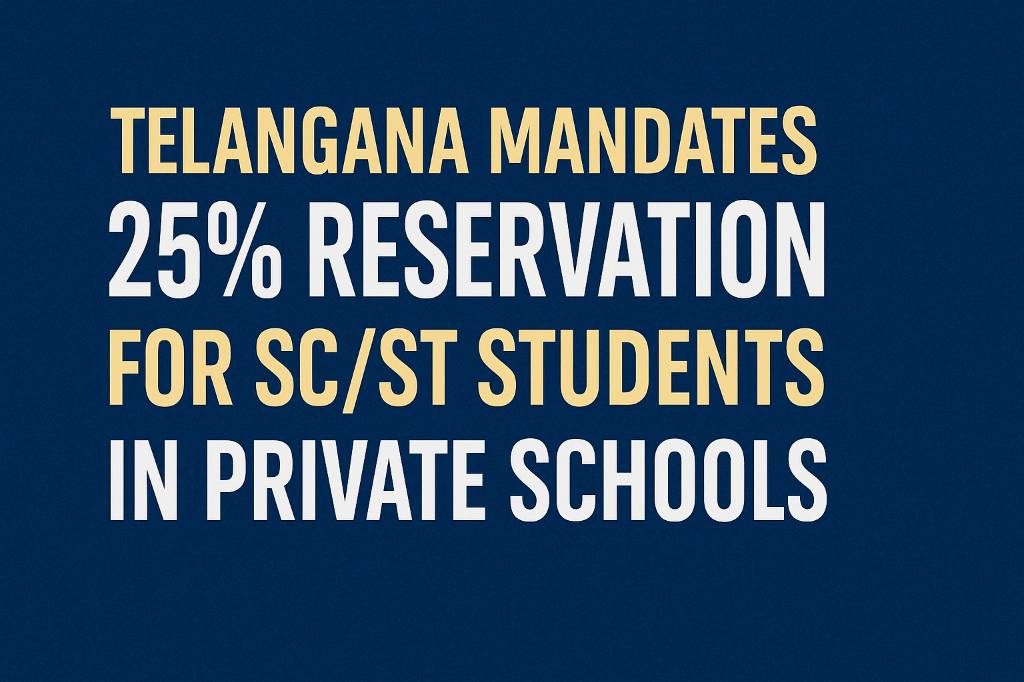
The Telangana state government’s recent decision to implement 25% reservation for SC/ST students in private and corporate schools has reignited the debate on caste-based affirmative action. While the move was introduced without protests or widespread media attention, it has caused concern among those who believe it could mark the end of meritocracy in private education.
- 25% Reservation for SC/ST Students in Private Schools
- Quick Look: Current Reservation Landscape in India
- The Constitutional Dilemma: Is It Legal?
- Is This About Inclusion or Vote Banks?
- What Happens to Private School Merit?
- Consequences: What’s at Stake?
- 1. Impact on General Category Students
- 2. Economic Drain on Middle-Class Families
- 3. Quality Dilution in Private Schools
- 4. Unequal Playing Field
- A Closer Look at Telangana’s SC/ST Demographics
- What About the Right to Education (RTE)?
- Reactions: Why No Outrage?
- Expert Views
- Global Comparison: What Do Other Countries Do?
- What Can Be Done?
- Conclusion: Quota Nation or Merit Nation?
This article explores the context, implications, legality, and political motivations behind this decision, and what it means for the future of India’s education system.
25% Reservation for SC/ST Students in Private Schools
In June 2025, the Telangana government passed a directive mandating all private and corporate schools to reserve 25% of their seats for SC (Scheduled Caste) and ST (Scheduled Tribe) students.
This is over and above the 25% reservation already mandated under the Right to Education (RTE) Act, which provides for economically disadvantaged children. In effect, schools may now need to allocate up to 50% of their seats under various quotas.
While the state government framed it as a progressive move to uplift backward communities, the lack of public debate and legal scrutiny has raised eyebrows.
Quick Look: Current Reservation Landscape in India
| Sector | Reservation Quota |
|---|---|
| Central Govt Jobs | 15% SC, 7.5% ST, 27% OBC = 49.5% |
| EWS (General Category) | 10% (Since 2019) |
| Educational Institutions | Same as above |
| Private Sector | No mandated quotas — until now |
| RTE Act (Private Schools) | 25% for EWS, not caste-based |
Until now, private sector education remained largely merit based, offering a competitive space for all, regardless of caste.
The Constitutional Dilemma: Is It Legal?
The Indian Constitution permits affirmative action in public institutions under Articles 15(4), 15(5), and 16(4). However, private unaided institutions have historically been excluded from mandatory caste based reservations, barring the RTE clause for EWS.
The Supreme Court in T.M.A. Pai Foundation v. State of Karnataka (2002) and later in P.A. Inamdar v. State of Maharashtra (2005) ruled that private unaided institutions have autonomy and cannot be forced to implement caste based reservations.
If Telangana’s directive is challenged in court, it could face serious constitutional hurdles.
Is This About Inclusion or Vote Banks?
Critics argue the move is not driven by inclusivity, but by political calculations. Here’s why:
- Telangana Assembly Elections are scheduled in 2028.
- SC/ST communities form a significant vote bank in rural and urban Telangana.
- Such welfare measures tend to generate loyalty and electoral support, especially if not met with resistance from other sections.
Despite its massive impact on private education, the decision was met with deafening silence from mainstream media, opposition parties, and civil society. Why?
Because it doesn’t affect the political narrative favoring social justice and challenging it would risk being labeled “anti-Dalit” or “privileged”.
What Happens to Private School Merit?
Private and corporate schools have historically been islands of academic excellence, drawing from merit, competitive exams, and performance.
With 25% of seats now reserved based on caste, the remaining general category students will compete for just 50% of the total seats.
This raises several concerns:
- Deserving general category students may be sidelined.
- Overall academic competition may reduce.
- Fee hikes may follow to offset “quota costs.”
For families from general or unreserved categories, a child’s future may soon depend more on a caste certificate than academic capability.
Consequences: What’s at Stake?
1. Impact on General Category Students
With just 10% EWS quota available to them, general category students already face limited opportunities in government institutions. The move to replicate reservations in private schools further shrinks their academic space.
2. Economic Drain on Middle-Class Families
To secure a seat in a reputable school without relying on quotas, parents may opt for even costlier international schools or tuition, increasing the economic burden.
3. Quality Dilution in Private Schools
If admissions start favoring quota over academic merit, there’s a risk of declining academic standards especially in elite institutions.
4. Unequal Playing Field
While SC/ST students may get free or subsidized access, general category students must pay full fees and still compete harder.
A Closer Look at Telangana’s SC/ST Demographics
| Community | Approx. Population Share |
|---|---|
| Scheduled Castes (SC) | ~17% |
| Scheduled Tribes (ST) | ~9% |
| Combined (SC+ST) | ~26% |
Given these figures, the 25% reservation almost exactly mirrors the community’s demographic share, suggesting a politically calculated move rather than a policy of upliftment
What About the Right to Education (RTE)?
The RTE Act mandates 25% reservation for EWS (Economically Weaker Section) children in private unaided schools not based on caste, but on economic condition.
The Telangana model goes a step further, shifting from economic criteria to caste criteria, despite the fact that:
- Not all SC/ST students are economically backward.
- Many general category students also fall below poverty line, but have fewer quotas available.
Thus, the principle of “economic justice” is being replaced with “caste preference.”
Reactions: Why No Outrage?
No protests from private school bodies.
No PILs filed (as of writing this article).
No national debate like the Mandal Commission era.
No public anger from the general category.
One reason could be that many elite schools are insulated from such state mandates, or that families have grown resigned to rising caste-based policies.
Expert Views
Dr. Anirudh Deshmukh, education policy analyst:
“We are moving from a merit based society to a certificate based one. The biggest irony is that reservations were supposed to be temporary.”
Advocate M. Natarajan, Supreme Court:
“Unless this is challenged in the High Court or SC, it may quietly set a precedent that allows other states to follow.”
School Principal (Anonymous):
“We’ll comply, but we fear this may impact our rankings and academic output. We may also see fee hikes next year.”
Global Comparison: What Do Other Countries Do?
| Country | Affirmative Action in Private Sector |
|---|---|
| USA | Yes (based on race/income, limited scope) |
| UK | No fixed quotas, but strong scholarships |
| China | No caste, only economic quotas |
| Germany | Merit-based education system |
India is among very few democracies where caste based quotas are considered essential across both public and private sectors.
What Can Be Done?
1. Push for EWS Based Reservations: Focus on economic status instead of caste to ensure real upliftment.
2. Cap Total Reservation: Enforce a legal cap (50%) on all forms of reservation, public and private.
3. Strengthen Govt Schools: Instead of burdening private schools, invest more in government education.
4. Awareness & Legal Challenge: Citizens, NGOs, and school associations must raise awareness or file PILs.
Conclusion: Quota Nation or Merit Nation?
The Telangana government’s 25% reservation for SC/ST students in private schools is not just a state level policy change it’s a signal of what’s to come.
If left unchallenged, other states may follow suit. For India’s vast general category middle class, especially those without wealth or political clout, this could mean fewer opportunities and greater dependence on private certifications and coaching institutes.
As we debate equity and justice, one question remains: Will the future of a child be decided by their marks, or their birth certificate?
Stay connected with The News Drill for more updates.
If you have insights, questions, or tips related to education policy and reservation reforms, reach out:
📧 Contact us: contact@thenewsdrill.com
🗞️ Submit tip or story: editor@thenewsdrill.com or visit our contributor page.
Follow us on X for the latest updates.
















